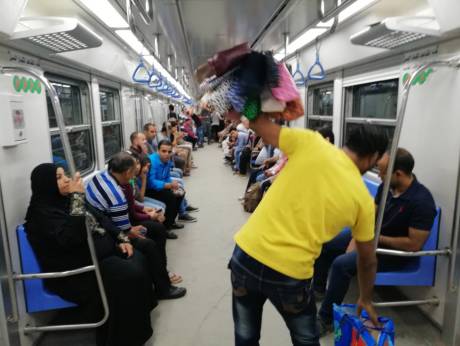For more than seven years now, Hasuna Saber has done the same job.
With a bag strapped to his back, he hops every morning onto trains of the underground metro, the Egyptian capital’s most reliable means of public transport.
But unlike other commuters, he does not use the metro to go to work—he is already at his job.
Saber, 37, is one of dozens of unlicensed vendors peddling a wide array of goods ranging from leather products, children’s toys, mobile accessories to sweets.
They are part of Egypt’s multi-billion-dollar informal economy.
“Since I lost my job in a leather factory in the mess that followed the revolution, I have turned to the metro to earn a living,” the father of three, said, referring to the 2011 uprising that forced president Hosni Mubarak to resign.
“This trade has helped my family survive the hard times that followed the revolution.”
Egypt experienced post-revolt street turmoil that has taken a toll on the country’s economy, mainly its vital tourism industry.
Saber sells shoe sole pads.
He hides them inside his bag to avoid being spotted by police on duty at the metro stations.
Unlicensed hawking is against the law and violators risk a fine of 100 Egyptian pounds (Dh 20.5) and confiscation of their goods.
“What else should we do? Steal people’s wallets in order to survive?” said Saber angrily inside a metro coach where he pursued his small business.
“Life is getting more expensive every day and we just want to earn our livelihood,” he added as he kept looking warily to avoid being caught by police.
“I don’t have the money to buy or lease a shop and spare myself this daily trouble and police hunt,” he told Gulf News.
“We aren’t doing anything wrong,” he said, speaking on behalf of others like him.
“We are doing a service by selling people the items they need at much lower prices than they can get at retail stores.”
Saber sells a single pair of sole pads for five Egyptian pounds, which is 50 per cent cheaper than the market price.
He buys the goods from the wholesale merchant in Cairo’s old quarter of Al Muski and pays the merchant back in instalments.
IOU slips serve as the contract between the two vendors and if Saber does not pay on time, the merchant can report him to the police and he can go to jail.
Its a tough job. Not only does he run the risk of getting arrested but Saber faces fierce competition from fellow peddlers.
Just as Saber stepped foot on the metro, another peddler jumps in.
The young man waited until the sliding doors closed before he plunged into displaying his salesmanship skills.
“Oh good people, I’ve brought you a magical tool that easily peels potatoes without waste,” he started in a melodious tone, while showing off gadgets apparently made in China.
In an attempt to whip up potential customers’ interest in his goods, he announced an “Unbeatable” offer.
“Not for 15 or 10 pounds, anyone who comes up with five pounds will get one,” he told passengers.
Some of them seized the offer.
“The people are very poor like us,” said the hawker, declining to give his name for fear of legal trouble.
“We don’t cheat the passengers. Some can barely afford the the price of the metro ticket,” he said.
Last month, Egyptian authorities hiked fares of the metro by up to 250 per cent as part of austerity measures aimed at healing the country’s ailing economy.
The government said that the hike, the second in less than a year, was necessary to upgrade the metro service.
However, some travellers say that authorities have done little to improve the service and keep illegal peddlers at bay.
“I know that life is hard for everyone in this country, but these sellers are a nuisance,” says a female passenger.
“They add to the crowding of the metro and make a lot of noise with their loud cries,” she added.
Women also complain the vendors grope them, especially when carriages are packed during rush hour.
Sexual harassment rates in Egypt are among the highest in the world with a whopping 99.3 per cent of women saying they had encountered harassment, according to a 2013 UN report.
About the metro
The first line of the system was built in 1980s.
It has since expanded into three lines, one of them running under the Cairo Nile.
It transports an estimated 4 million people a day.

